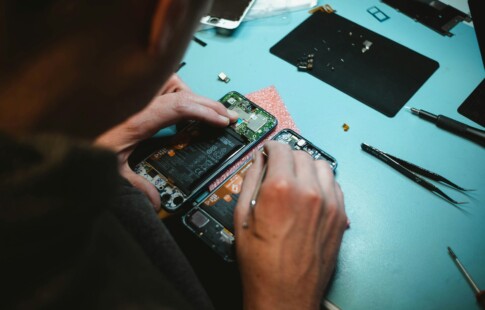
How to Recycle Your Old Batteries Safely
We are reader-supported. When you buy through links on our site, we may earn affiliate commission.
When battery power runs out on a device, what do you do? You might not think about how to safely recycle your old batteries when you swap them out.
Modern society runs on batteries. Flashlights, electronic clocks and watches, cameras, cellphones, laptops, and even cars are powered by different kinds of batteries. While some of these batteries can be used for a long time, all of them wear out eventually.
When a battery stops working, it’s usually not a good idea to throw it away. Many batteries contain hazardous chemicals which can harm animal life and pollute water sources. Here’s everything you need to know about how to dispose of your old batteries safely.
What Are Batteries Made Of?
The composition of a battery affects how you should dispose of it after use. The batteries you can buy in packs at the store are called single-use batteries and include AA, AAA, C, D, and 9 Volt batteries. These batteries are split into alkaline and zinc-carbon batteries, depending on how they derive energy.
Button-cell batteries look like coins and are commonly used for small electronics. Older versions of these batteries included heavy metals like silver and cadmium, but newer versions are more likely to contain lithium. These batteries are also only used once.
Some batteries are rechargeable, and these derive their energy from nickel-cadmium, nickel metal hydride, nickel zinc, lithium-ions, or lead-acid. Rechargeable batteries are found in cellphones, laptops, cordless electronics, radios, electronic toys, and hospital equipment. Although they can last for a long time, even rechargeable batteries stop working eventually.
Vehicles like cars, boats, and motorcycles run on lead-acid batteries. Large lead-acid batteries can also be used for backup power for important equipment. Electronic Vehicles (EVs) run on medium to large lithium-ion (Li-ion) batteries, which can be recharged at charging stations. Large Li-ion batteries are also sometimes used for backup energy because of their large storage capacity.
Which Batteries Can You Recycle?
All batteries can be recycled, but some are more important to recycle than others. You also won’t be able to throw them into your local recycling bin since many batteries contain hazardous waste. However, there are special collection points where you can leave old batteries for professionals to handle.
Rechargeable and button batteries should always be recycled since they often contain heavy metals that are highly toxic to the environment. Lithium-ion batteries can actually overheat and explode, so sending them to a landfill is a recipe for disaster. Most drop-off centers will take these batteries and recycle them for free.
There’s some controversy over whether or not you need to recycle single-use alkaline batteries. In 1996, the Federal government passed a law that meant these batteries could no longer be made with mercury. Now that they’re free of this heavy metal, you can technically throw them away.
However, many recycling centers will recycle alkaline batteries for a small fee. Single-use batteries contain steel and other elements which can be conserved and reused. While throwing these batteries away may not harm the environment, recycling them is a more responsible use of resources. Most if not all battery components can be repurposed, and some batteries contain critical minerals which are valuable to recycle.
Where Do You Take Batteries?
While recycling options are different for every location, most people in the U.S. should have access to a battery recycling center. To find a place to drop off your batteries, you can start by searching Earth911’s website for a recycling center near your zip code.
Some hardware stores also recycle batteries. Home Depot, Batteries Plus, Batteries & Bulbs, and other local hardware stores may offer recycling services in your area. Before taking your batteries to a local store, always call to see if battery recycling is one of their services and to find out whether it’s free.
If you have a large number of batteries you want to recycle or you live too far away from a recycling center, you can consider sending your batteries to mail-in recycling centers. Companies like Terra-Cycle, The Big Green Box, Battery Solutions, and Call2Recycle will all recycle old batteries for a fee.
Some batteries can be difficult or dangerous to remove without professional help. If you’re having trouble getting a battery out of your device, you can take the whole device to the recycling center so the battery can be safely removed. EV batteries should only be removed by professionals.
One Man’s Trash…
Although it may be convenient to throw old batteries and electronics in the trash, these power units contain hazardous materials that can harm the environment. Recycling batteries is a better use of natural resources and keeps heavy metals and hazardous waste from accumulating in landfills and polluting the water.
Use this guide to recycle your old batteries at a location near you. Although single-use batteries aren’t ideal for the environment, recycling them is an important step you can take to protect the planet and help create a more sustainable world.
Share on
Like what you read? Join other Environment.co readers!
Get the latest updates on our planet by subscribing to the Environment.co newsletter!
About the author

Jane Marsh
Starting from an early age, Jane Marsh loved all animals and became a budding environmentalist. Now, Jane works as the Editor-in-Chief of Environment.co where she covers topics related to climate policy, renewable energy, the food industry, and more.





